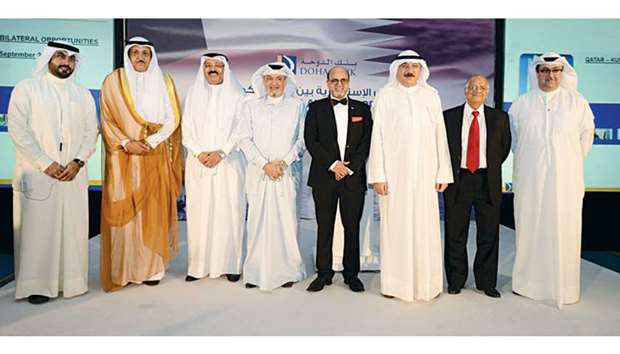Doha Bank hosted a knowledge-sharing event on “Qatar-Kuwait bilateral opportunities” in Kuwait City on Tuesday.
In his keynote address, Doha Bank CEO Dr R Seetharaman said: “According to IMF July 2017 outlook, economic activity in both advanced economies and emerging and developing economies is forecast to accelerate in 2017, to 2% and 4.6% respectively, with global growth projected to be at 3.5%. Current global growth prospects are encouraging, though the pace of growth is still weaker than desirable.”
On Kuwait economy, he said, “Kuwait’s non-oil growth is expected to improve in 2017 and 2018. Kuwait Banking sector lending growth was more than 7% on y-o-y basis in the first half of 2017 and deposit growth was flat. Government-funded projects will drive economic growth. Domestic interest rates moved up in June 2017 even as the Central Bank of Kuwait opted to keep its key policy rate on hold following the US Fed hike. Though the central bank refrained from hiking the discount rate in June, it did increase the overnight repo rate by 25 basis points, which helped lift interest rates. Qatar-Kuwait bilateral trade was in excess of QR2.7bn in 2016.”
Highlighting opportunities in Kuwait, Seetharaman said: “This year Kuwait has unveiled a new plan to transform the country into a regional financial and cultural hub by 2035. It has organised seven pillars, which are areas of focus for investment and improvement. The Kuwait budget deficit 2017-18 is projected to be $21.6bn, with revenues estimated at $43.6bn and expenditure at $65.2bn.”
Kuwait is coming up with infrastructure projects such as Kuwait Metro, Kuwait International Airport expansion and regional highway. Kuwait’s 2035 vision stresses the importance of developing tourism and its role in supporting Kuwait’s economy by creating employment opportunities in the private sector.
On the recent reforms brought by Qatar and the potential opportunities therein, he said, “Qatar is ranked 18th in ‘the Global Competitiveness Report 2016-17’ and stands second in the region. A new law for Public Private Partnership (PPP) businesses in Qatar should provide an additional level of comfort to the private sector and foreign investors. In February, Qatar issued a new law on arbitration, inspired by the UNCITRAL Model Law — an international template for law on arbitration.
“In terms of food security, Qatar now has many local companies that are supporting the country and it can develop these businesses further and boost its food production to provide both locally and internationally.”
Qatar Budget 2017 has allocated for key sectors such as health, education and infrastructure an amount of QR87.1bn, which is made up of nearly 44% of the total expenditure in the 2017.
Transportation and infrastructure projects, which represented a main pillar of enhancing sustainable development, have been allocated QR42bn.
The accomplishment of the New Orbit Highway will facilitate the World Cup infrastructure works as per schedule. Qatar’s landmark residency plan is a welcoming social and economic reform. It will attract skilled expats to have a career in Qatar. It will also encourage investors as they would be able to launch business ventures. It will help migrants to further integrate with Qatar’s society.
“On the whole, the landmark residency plan will enhance expatriates participation in Qatar’s economy and society in various forms and thereby contribute to sustainable growth of Qatar. Qatar has also waived entry visa requirements for citizens of 80 countries,” he said.
Doha Bank gave a farewell to Ahmed Yousuf Ahmed al-Mehza, chief country manager (Kuwait). On behalf of Doha Bank, Seetharaman thanked him for all the efforts taken for the organisation and wished him good luck in all his future endeavours. He also welcomed Loai Fadel Mukamis as the new chief country manager of Doha Bank Kuwait branch.

Seetharaman with dignitaries at the knowledge-sharing event on u201cQatar-Kuwait bilateral opportunitiesu201d in Kuwait on Tuesday.
